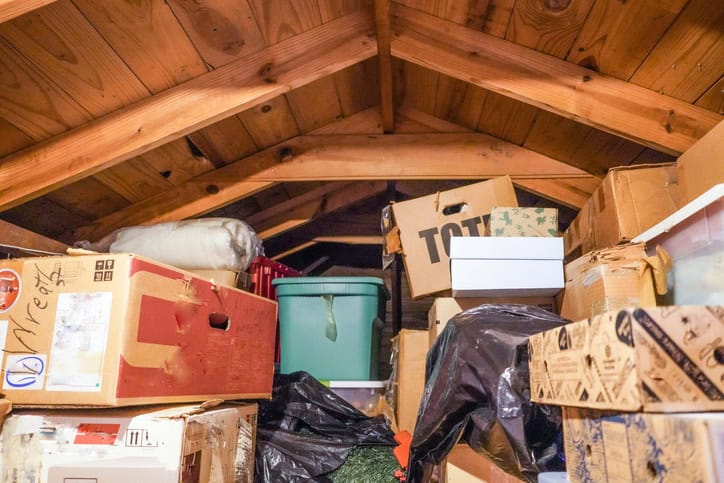
Does the mere thought of removing the clutter from your house fill you with anxiety? This is not an unusual phenomenon. Clutter and anxiety sometimes walk hand-in-hand. The clutter in our homes can make us anxious and then when we go to remove the clutter, we worry if we are doing the ‘right’ thing. It is one heck of a big catch-22. If this is something that haunts you, I have 5 hacks to share with you.
Before I share my hacks with you, I want you to know that one of the most important things to remember is the ‘right’ way to do something is that which works best for you. This is particularly true when it comes to organizing and removing clutter.
I am repeating this because clients always ask me for the ‘right’ way to organize ———– (you fill in the blank). The ‘right’ way to organize is the way that works best for you.
There is no hard and fast rule that says all clutter must be removed all at once. I think that would inspire anxiety in even the most even-tempered person.
As professional organizers, we know that if a home is filled with clutter removing it all at once without making thoughtful decisions can inspire the homeowner to fill the house back up again.
I ask you, what is the point of that?
We are back to talking about this catch-22. You know you want to declutter your home, but decluttering makes you anxious, so you avoid it. The more you avoid decluttering, the more clutter accumulates, and the more anxious you feel.
Here are 5 hacks to help you break this vicious cycle of clutter and anxiety
Hack #1: Do a brain dump
Write down every space that you want to declutter. Doing this exercise takes the information out of your brain (you don’t have to work on remembering this list of spaces). Once you have a list, decide which space to work on first.
You don’t have to do them in any particular order. In fact, you may want to tackle an area that is not so cluttered to avoid becoming overly anxious. Enjoy the success of organizing an easy small space.
Which space is so full of clutter that it brings you anxiety just thinking about it? You may want to address this area last.
Hack #2 Work with a trusted person (friend or professional organizer)
Decluttering your house can be easier if you work with a trusted friend or a professional organizer. Professional organizers are objective. They have no connection to you or your belongings and so can help you make thoughtful, and logical decisions. They can help you work through the things that may worry you.
A trusted friend can also help you. The fact that they know you well and know some of your history may be an advantage.
Hack #3 Create some rules to follow to reduce clutter and anxiety
Rules can be very helpful. Decide which rules you will follow and then write them in big, bold print on your favorite-colored poster board. This makes them easy to refer to for you and anyone else with whom you may be working.
Some sample rules may be:
- If something is broken, toss or recycle it
- If something is missing parts, toss or recycle it
- If something is still in a box, donate or sell it
- If you do not ever want to display something because you dislike it, donate or sell it
- Recycle any magazines more than 6 months old
- Donate or sell clothes that are too big or too small
For instance, if something was a gift that has not seen the light of day (in other words, is still in the box) you may hesitate to let it leave your house. I guarantee you a professional organizer will advise you to either donate or sell that item.
Maybe your grandmother, aunt, or mother used to display a porcelain vase on their mantle. It’s now yours. Just looking at this vase (which is at the back of a top shelf in a closet) gives you anxiety. You worry that donating it is the wrong thing to do. A trusted friend or a professional organizer will tell you that if you don’t love it, you don’t have to keep it.
Hack #3 Tackle only one small space at a time
Keep your anxiety at bay by working in one very small space at a time. You can even decide to tackle just one drawer or one cupboard or even one shelf in a cupboard.
Hack #4 Work for short periods of time
Declutter your home for short periods of time. Set a timer for 10 minutes. You will be amazed by how much you can accomplish in just 10 minutes. Gather your supplies before you begin to declutter. You will probably want a trash bag, a box to hold recycling, and another box for things that don’t belong in that space.
Now you’re ready to begin. Start the timer and declutter the small space in which you have decided to work.
Stop when the timer goes off and evaluate your progress.
Are you finished? Do you have just a little more to do? How do you feel about it?
If you are ready to stop, then walk away. It’s better to stop when you are ready than to push yourself into feeling anxious.
Maybe you can work for another 5 minutes to finish this one space.
Or, if you are feeling great about the work and this success has motivated you to do more decluttering go for it.
Decide where to work next, gather your supplies, and do another 10-minute decluttering session.
This deck of cards: Organize Your Home 10 Minutes at a Time provides step-by-step instructions for decluttering one small space at a time. Use these cards for inspiration if you don’t know where to begin.
Hack #5 Reward yourself
I always work better when I know why I am doing something and if there is something in it for me.
Set yourself up for success by identifying why it is important to declutter your home.
Post your personal reason somewhere visible.
Then reward yourself every time you complete a decluttering session.
Give yourself time reading a book.
Indulge yourself with an ice cream sundae.
Sit and watch the grass grow.
Do something just for you to reward yourself.
Continue scheduling these short decluttering sessions until the clutter in your home is reduced to your satisfaction.
Use these 5 hacks to help you as you work to break the vicious clutter and anxiety cycle. If you want to tackle decluttering your home on your own without a trusted friend or a professional organizer by your side but would like additional guidance, join the Clear Space for You clutter support group. This is a group I run with Jonda Beattie. We start new groups every month.
Diane N. Quintana is a Certified Professional Organizer® ,a Certified Professional Organizer in Chronic Disorganization®, Master Trainer and owner of DNQ Solutions, LLC and co-owner of Release●Repurpose●Reorganize, LLC based in Atlanta, Georgia.


I love a brain dump! The less information I need to store in my memory, the clearer my mind feels. Writing down goals and projects is so important! The suggestion to create rules is fabulous. It’s a lot easier to create rules beforehand than to decide in the moment. If you find a broken item, you instantly know what to do with it. Starting from scratch about whether to keep or get rid of something when you’re looking at the item is too much work!
Diane, Great tips, and I really think doing one small space at a time can produce big results. Clients often get overwhelmed with the amount of stuff they have to go through. Anxiety increases as well. Taking things slow and easy will still produce long-term effects.
This combines therapy with organizing in a way’s completely organic. Just the list of sample rules is worth the price of admission, because it gives people such a great jumping off point for feeling like they have a handle on things. (I usually tell clients, “If it’s still in a box, never used, either use it today or send it on its way.” The prospect of actually using it, instead of potentially using it, is usually enough for someone to realize whether they really want it or not. And I absolutely loved that you reiterated the fact that the best way is always the way that you’ll actually do it! Great job!
So agree that there isn’t “one right way.” There are certainly fundamental principles, but the process can look different from one person to another. I’ve noticed lots of my clients enjoy working a bit every week. This way, there is consistent forward progress, but we don’t really reach the point of overwhelm. This approach also helps to strengthen the decluttering muscle. It gets easier as you go along, and your space just looks and functions better and better!
Great post! It is so important to declutter in small chunks of time. We need to stay focused, and prolonged periods will distract us. My clients have consistently preferred to organize in 2-hour or 4-hour increments.
These are brilliant, Diane! I especially love your declarative statement, “The ‘right’ way to organize is the way that works best for you.” All of the hacks you suggested, incorporate this philosophy. You get to decide your decluttering parameters based on your needs, desires, and anxiety-levels. I’ve found Hack #3 (establishing parameters/rules/boundaries) to be especially useful. It helps to mitigate decision-fatigue by making certain decisions ‘no-brainers.’ And if a client sets the rules and one doesn’t work, it can always be amended. That’s the beauty of the idea you shared “the way that works best for you.”
I discovered the value of having an objective helper when my sister went through my wardrobe with me several years ago. I thought I was in good shape because I’ve nearly always done it twice a year with the change of seasons, but she pointed out things that were unflattering or just plain tired looking that I would have kept, and I ended up getting rid of two large garbage bags full of clothes!
These are all amazing tips! I love the reward one personally. I agree that a lot of the anxiety around clutter comes from exactly what you identified. We all don’t want to make a mistake by giving something away or trashing something that is truly valuable. But, the chances of that happening are so slim so it really does come down to the question, “Does this item have value FOR YOU?” Great article as always! Thank you.